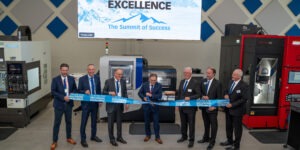Making High Efficiency Production and Inspection Even Better
System-integrated and inexpensive, the precision measurement I/O technology of the ELM314x EtherCAT Measurement Module from Beckhoff Automation improves the process reliability of highly efficient machines and test benches used in final inspection.
Posted: July 26, 2019
The ELM314x economy line from Beckhoff Automation LLC (Savage, MN) is part of their EtherCAT measurement module family that supplements the established ELM3x0x line with a lower cost 1 ksps class. This I/O system expansion simplifies the use of system-integrated precision measurement technology, which taps significant optimization and efficiency potentials both in production machines and for inline test benches. The ELM314x measurement modules are available in two, four, six and eight-channel versions. High-precision measurements with an accuracy of 100 ppm are possible over a wide temperature range from 10 deg C to 40 deg C. Each channel in the measurement modules can be set to current or voltage measurements with a sampling rate of up to 1 ksps per channel. Analog signals in the ranges from ±1.25 to ±10 V, 0 to 10 V, ±20 mA or 0/4 to 20 mA can be processed. This economy line offers considerably reduced channel costs, but provides the same wide range of functions as the ELM3x0x line, including freely adjustable two-stage filters, oversampling, distributed clocks, true RMS and scaler functions. The extensive diagnostic features for unattended, long-term use familiar from the ELM3x0x line are also implemented.
Sampling at 1 ksps per channel is suitable for a wide range of applications. In particular, the processes of moving machine components or the final inspection stage of inline test benches can be optimally mapped with the economy line in order to reliably control the processes. Typical examples include part geometry measurement on the fly, as well as fast yet highly precise weighing procedures, such as in bottling plants. In general, the ELM314x EtherCAT measurement modules are ideal for recording data from 10 V/20 mA sensors and for feeding real-time information directly back into the process. The speed, reliability and accuracy of production and test processes can be increased significantly with these insights. Efficient data logging for subsequent process analysis and optimization is also just as easy: If increased requirements necessitate higher sampling rates, the ELM3x0x measurement modules with up to 50 ksps can be used instead for vibration measurement on fast-running machines in order to implement active vibration compensation or predictive maintenance, for example.
Exceptional performance and ease of use have always been the hallmarks of the EtherCAT protocol. Now, EtherCAT G gigabit communication technology from Beckhoff Automation takes EtherCAT performance to the next level by delivering the Gbit Ethernet speeds needed to support highly data-intensive applications. This industrial Ethernet technology expansion is not only compatible with the globally-established 100 Mbit/s EtherCAT standard, but also provides the same familiar ease of use. In addition, the branch controller model for EtherCAT G enables efficient operation of multiple network segments in parallel. EtherCAT G supports standard Ethernet transmission rates of 1 Gbit/s. Its EtherCAT G10 counterpart is even faster, with data rates of 10 Gbit/s. The sharp increase in transmission rates beyond the standard 100 Mbit/s provided by EtherCAT significantly increases the possible data throughput. With propagation delay times through devices as a limiting factor on the one hand, but boosted by the newly introduced branch model on the other, EtherCAT G can deliver a two-to-sevenfold performance increase, depending on the application.
“EtherCAT G and G10 raise performance to entirely new levels that will enable our customers to build the best, highest performing machinery in the world,” commented Hans Beckhoff, the managing director of Beckhoff Automation. “They are not meant to replace the highly successful EtherCAT standard based on 100 Mbit/s Ethernet. These new performance levels are intended as system-compatible expansions.” Though it is not a substitute for standard EtherCAT, EtherCAT G shares the same characteristics, yet achieves even higher transmission speeds without changes to the protocol or the master software. Fully compatible with the globally-established standard, EtherCAT G provides the same field-proven capabilities, including built-in diagnostics, high-precision synchronization and, most importantly, unrivalled telegram processing on the fly. It also conforms to the IEEE 802.3 Ethernet standard.
The high performance offered by standard EtherCAT remains more than sufficient for the majority of today’s applications. EtherCAT G has been developed specifically in anticipation of extremely large-scale applications and greater use of highly data-intensive equipment, such as machine vision cameras, complex motion control systems and measurement equipment operating with high sampling rates. EtherCAT and EtherCAT G can be combined within a heterogeneous network. This means that EtherCAT G slaves can operate in a 100 Mbit/s EtherCAT network and vice versa. In both instances, EtherCAT G equipment falls back to the 100 Mbit/s rate. With the new EtherCAT G branch controller model, though, EtherCAT branches can be set up to enable the parallel operation of 100 Mbit/s segments within a 1 Gbit/s network through a conversion of transmission rates. For instance, the EK1400 EtherCAT G Coupler can create a branch that steps the data rate down from 1 Gbit/s to 100 Mbit/s, making available the wide range of standard EtherCAT Terminals for use as I/Os on an EtherCAT G network. Based on the branch controller capabilities of the EK1400, the 1 Gbit/s data rate on the EtherCAT G trunk remains unaffected.
Another advantage of the EtherCAT G branch controller system is that it minimizes propagation delays. The CU14xx branch controller series is designed specifically to interconnect EtherCAT and EtherCAT G segments and enable parallel operation. This setup significantly reduces signal propagation times and ultimately shortens communication and cycle times, because telegrams coming back from a given segment travel straight from the branch controller to the master at the higher transmission rate of 1 Gbit/s, independent of other network segments.
Beckhoff Automation LLC, 13130 Dakota Avenue, Savage, MN 55378, 952-890-0000, Fax: 952-890-2888, [email protected], www.beckhoffautomation.com.
















